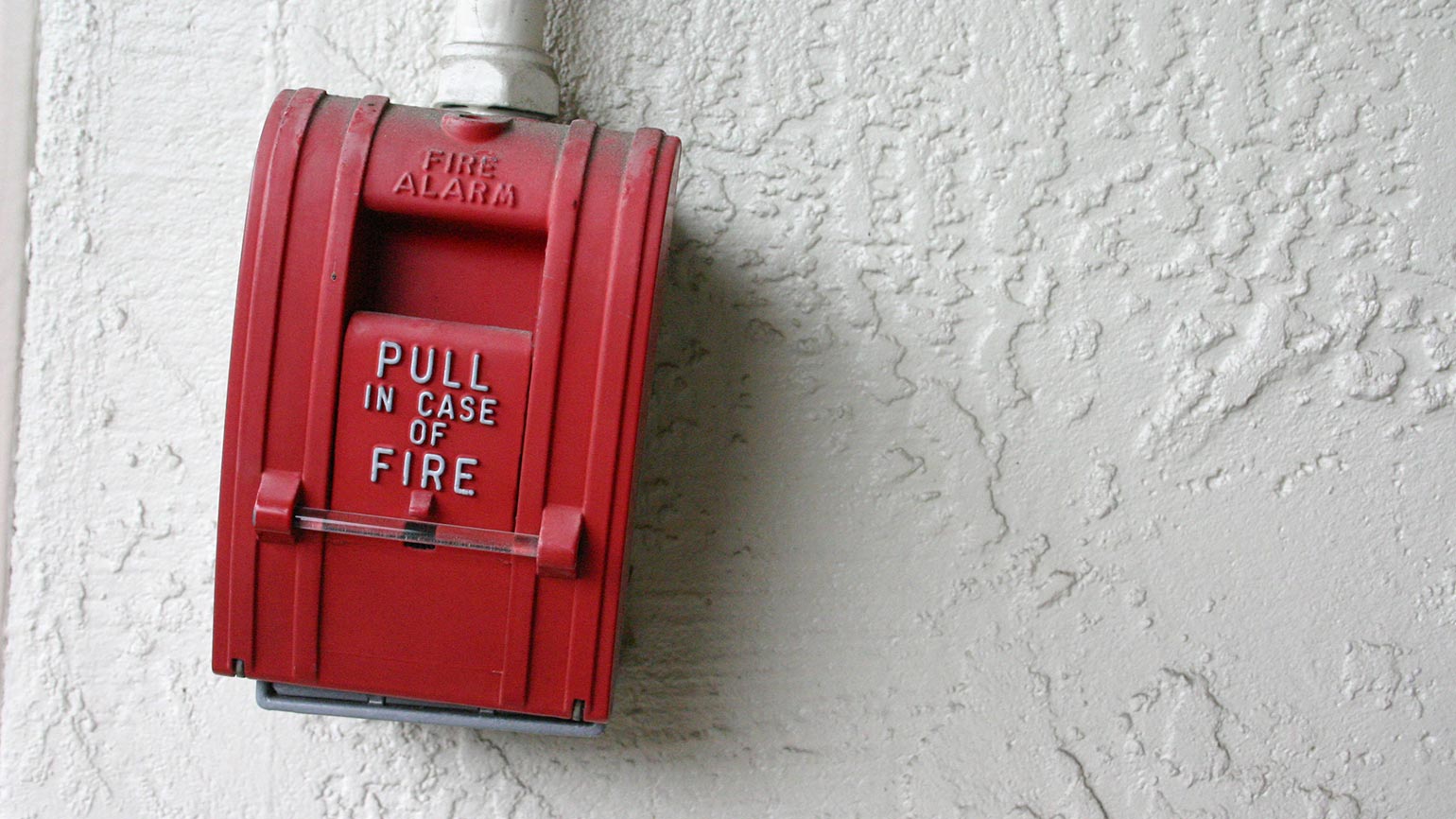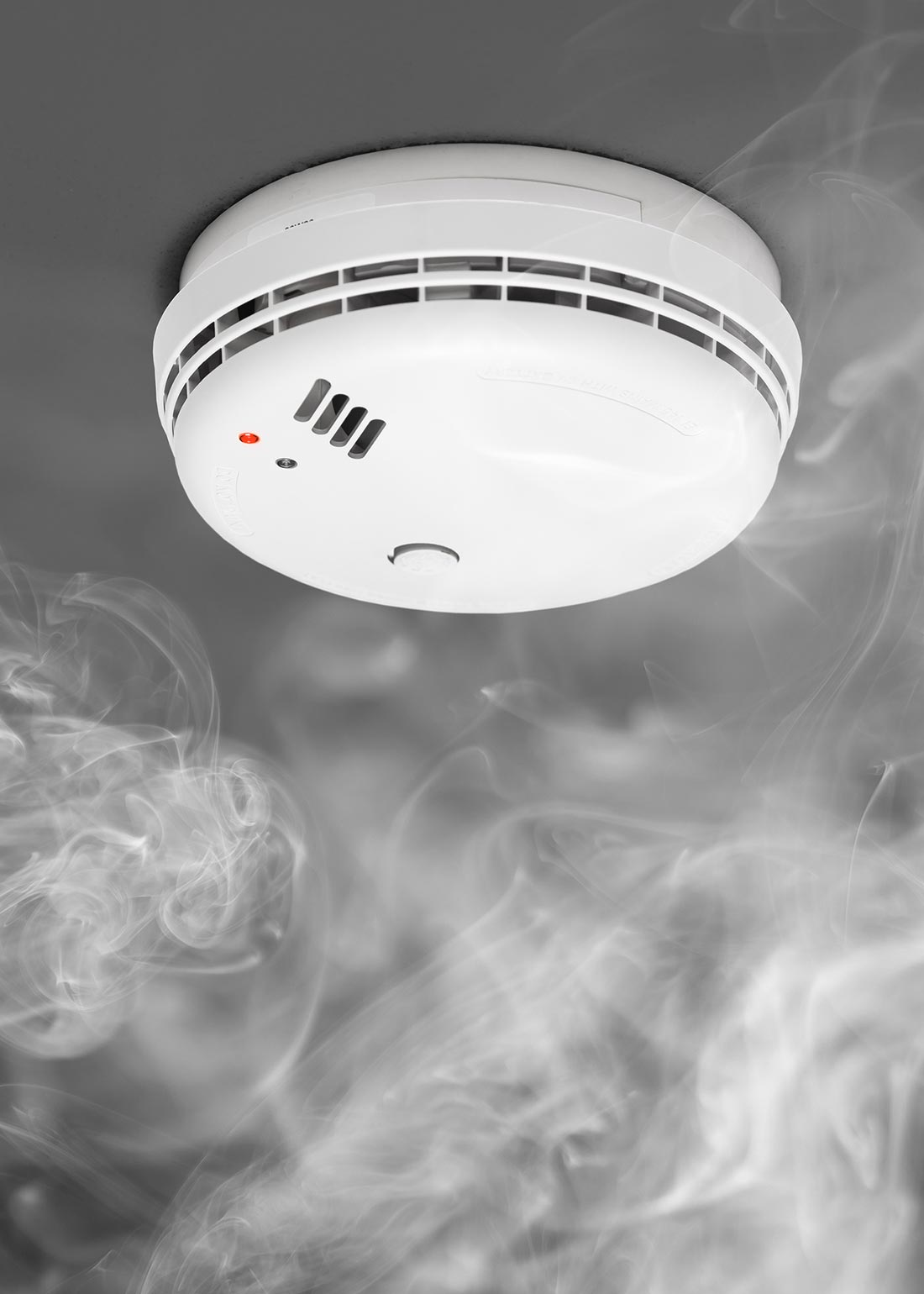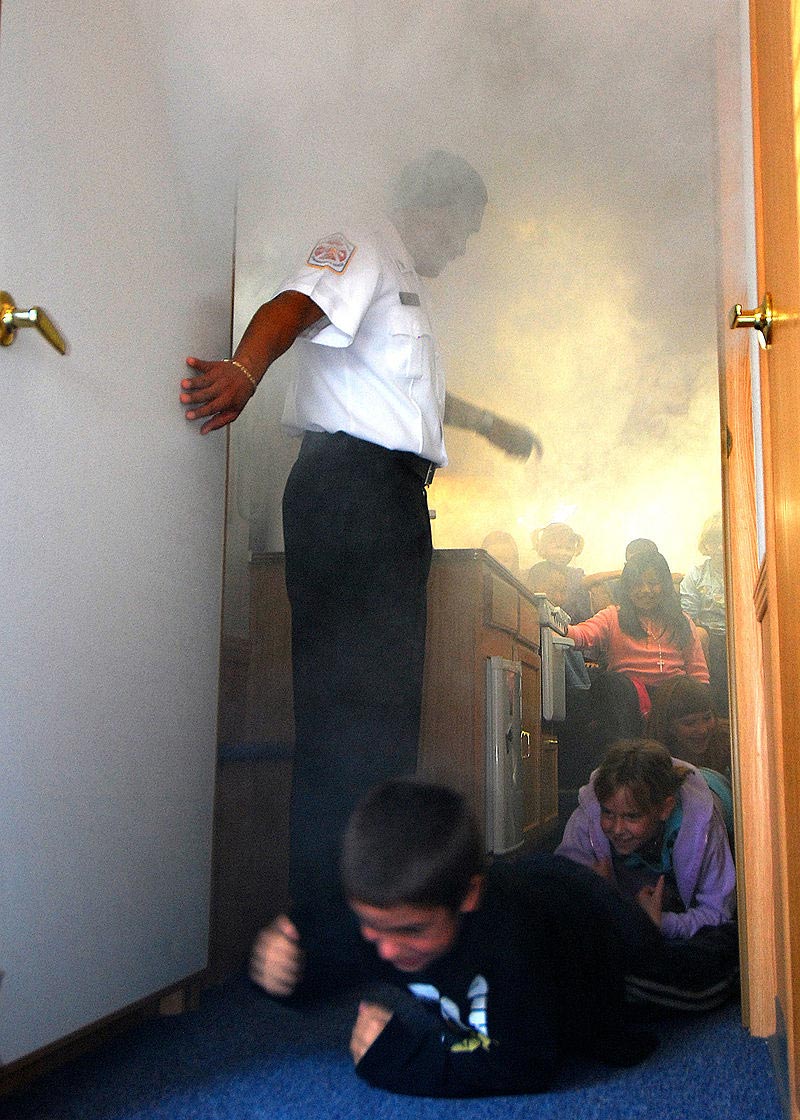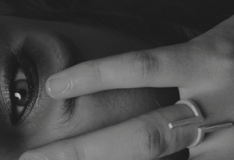
Reporting a Fire or Emergency
The following is the 6-step procedure for reporting a fire or emergency. The public should report emergencies using this method:
- Telephone for help. Dial 911
or 292-5555 for the Fire Department
or ‘0’ (zero) for the Operator - State the nature of the emergency.
- Give address, with cross streets or landmarks if possible.
- State your name and location.
- Give the telephone number from which you are calling.
- Stay on the line if requested to do so by the telecommunicator.
Fire Prevention
General Tips
- Don’t leave children alone near cooking or heating appliances.
- Keep matches/lighters out of reach of children.
- Make sure elderly persons take fire precautions.
- When smoking, use large ash trays. Do not empty them until ashes and butts are cold.
- Check sofa and carpet for smouldering butts or ashes after entertaining guests. Don’t smoke in bed. It is a major cause of home fires. Don’t smoke in a workshop/garage.
- Don’t use a naked light in a garage/workshop.
- Check portable heaters. Ensure that they cannot be knocked over and are kept away from furniture and furnishings.
- Never block possible fire exits.
Electrical Hazards
- Don’t overload extension cords or outlets.
- Don’t patch worn cords or use cracked plugs, replace them.
- Don’t nail or staple cords. Do not place under rugs and carpeting or across hooks and nails. Untie knots in cords. Knots damage insulation and pinch the wires.
- Replace blown fuses with the correct size.
Cooking Safety
- To extinguish a grease fire, turn off the heat and try to smother the fire using the correct fire extinguisher, a pot lid or a wet towel. Never use water or water-based extinguishers on a grease fire.
- Do not risk carrying out a burning pot/pan. Closing the oven door and turning off the heat usually extinguishes an oven fire.
- Never store food and utensils above the stove where you have to reach across heat to get to them.
- When cooking wear short sleeves or tight-fitting long sleeves to reduce the chance of dragging clothing across a hot element or through hot grease.
- Do not dry or air clothing over a stove.
- Never use outdoor barbecues indoors. This is due not only to the fire hazard, but because deadly carbon monoxide gas will be released.
- After lighting a barbecue using the appropriate starter, do not add more liquid starter to hurry it along. Never use gasoline, naptha, kerosene or any flammable liquid as a starter.
Flammable Liquids
- Gasoline, propane and other dangerous flammable liquids should not be stored in the house. Store such liquids in a detached shed or garage in a safe, well ventilated area. Store flammable liquids only in approved safety containers, not in a glass jug, discarded bleach bottle or other makeshift containers.
- Gasoline containers should not be filled more than 3/4 full, to allow for expansion, when transportation in a vehicle or car trunk cannot be avoided. As a precaution, the vehicle or trunk lid should be opened periodically to assure there is no leakage or accumulation of vapors. Containers of propane should never be carried anywhere within a vehicle where vapors will be confined.
- Be sure the motor is turned off and you are not smoking before filling gasoline-fuelled appliances or mowers.
- Never repair gasoline-fuelled items in the house or near an ignition source such as a heater.
- Never use a flammable liquid to start trash fires.
Open Flames
- Candle fires have been increasing over the past years.
- Candles and oil-burning lamps should have stable holders and should be used in open, well-ventilated areas away from combustibles.
- If you are leaving a room, extinguish all flames.
- Never leave a child alone with an open flame, even briefly.
- Keep flashlights and batteries ready in case your electric power goes out. Walking around with a candle during an emergency could be dangerous.
Early Warning

Install a Smoke Detector
Most fatal residential fires strike at night while people are sleeping. During a fire, smoke and toxic gases can kill by consuming valuable oxygen your brain and lungs need to function.
Signs of Oxygen depravation due to fire:
- Thinking and co-ordination difficult.
- You may be disoriented and your senses may be numbed.
- You breathe faster and with greater difficulty, quickly using the little oxygen that is left.
- If the fire is far enough advanced, eventually breathing becomes impossible.
A smoke detector can sound the early warning that should awaken you, giving you that extra time needed for escape. The very smoke that can kill will activate your smoke detector and possibly save your life. Every home should have a smoke detector outside each bedroom area on each floor level. Additional detectors should be installed at the head of each stairway and in each bedroom occupied by a smoker. When purchasing detectors, look for a label indicating approval by a recognized testing laboratory. Install and maintain, including regular testing and cleaning in accordance with the manufacturer’s instructions. Batteries should usually be replaced yearly.
Fire Response Procedures
Know Your Home
- Check all possible fire exits. Do all windows open easily? Are any exits blocked with furniture or trash? Do second story windows require fire ladders? Always sleep with interior doors closed. This will slow the speed of fire and smoke and increase your escape time.
Fire Drills
- Regularly practice fire drills with the entire family. People tend to panic in a fire. Drills help the correct procedures become habit. The objective of fire drills should be simple – to get out.
- Practice escaping from alternate routes, two from each room if possible.
- Know your way to exits well enough that you can find them while crawling in the dark. Actually practice this.
- For children, home represents safety when frightened or hurt. Teach your children that if your home is on fire, it is no longer is a safe place. As young as possible, children must learn how to escape on their own in the event that a parent cannot help them. They must learn that they cannot hide from fire, but must escape it and not return for any reason. Be sure they understand this.
- As you leave each room close the doors behind you. In an actual fire this will slow the spread of fire and smoke, increasing your escape time.
- Designate a meeting place for your family to gather. Usually a good place is the front yard a safe distance from the house.
- Post the fire and police department number beside every phone. Be sure that your children know their telephone number and address in the event that they need to call the fire service or police department for a fire or emergency. Help him or her to practice doing so and remind them to speak clearly and loudly so they will be understood.
- Remember that this information is available in the Community section of the Yellow Pages. Encourage young people and adults to look over this regularly.

Fire Escape Procedures
- Quickly get out of bed and feel your closed bedroom door. If the door is not warm, open it while bracing your body against it. You may have to quickly close it again.
- If the hallway is clear, alert the rest of the family. Quickly and calmly evacuate the house, closing doors behind you.
- Don’t take time to dress or retrieve belongings. A seemingly passive fire can intensify in seconds.
- If the bedroom door is warm and smoke is coming in through the cracks, you should not use it as a means of escape. Use the window as an alternate.
- If there are children with you, never get out first. They may panic and not follow you. Instead, lower them out before you.
- If possible, close the window/door behind you. This will cut off a fresh source of oxygen for the fire.
- Unless there is a ladder, balcony or another roof to climb to, it is not recommended that you use anything higher than a second storey window for escape.
- If necessary, make a rope by knotting sheets or drapes together. Tie one end to a bed or heavy piece of furniture.
- If you cannot make a rope, drop cushions/bedding to break your fall.
- Get through the window feet first, lower yourself to the full extent of your arms and drop.
- If you cannot use either the door or window for escape, stay calm. The first consideration of the Fire Service will be rescue.
- Seal cracks around the door with rugs, blankets, etc.
- If possible, wet the door and area. Stay low because heat and smoke rise.
- If smoke is entering, place a wet cloth over your mouth and nose.
- Shut off any fans and air conditioners.
- Signal at the window.
- Never return to a burning building.
Clothing On Fire
If clothing catches on fire, do not run. Running will intensify the fire. Instruct your family to stop, drop and roll. If someone else is on fire, tackle or knock them down making them roll. Smother the fire with a blanket or rug.
Portable Fire Extinguishers
A portable fire extinguisher is designed for use only on small fires. In the event of a fire, call the Fire Service and report the nature of the fire. Get everyone safely out. Only then should you try to extinguish the fire. Use the appropriate fire extinguisher in accordance with the instructions on the label. It is important to use the correct type of extinguisher, considering the type of fire. Use of the wrong kind will result in ineffective extinguishment or can even contribute to fire spread. When only one fire extinguisher is installed in your home, it should be an all purpose dry chemical type (Type C). All fire extinguishers must be labelled by a recognized testing laboratory. Consider equipping your automobile, boat and tent with an approved type fire extinguisher. After every use, your extinguisher should be recharged as soon as possible.
Fire Service Dispatch Procedure
The Bermuda Fire Service has two Emergency Medical Dispatchers (EMD) on duty at all times. The dispatcher’s main duty is to receive the routed 911 call from the Police and dispatch either a fire truck or ambulance to an emergency or, in some cases, both depending on the nature of the incident. When you speak to the Fire Service dispatchers the following actions are being carried out: EMD “A” will obtain pertinent information from the caller and give pre-arrival instructions to the caller if necessary, e.g.
- Exit house in the case of fire
- CPR, direct pressure on bleeding sites
- Don’t remove the helmet from a cycle accident victim
The Bermuda Fire Service and the Association of Public Safety Communications Officials (APCO) created these pre-arrival instructions. While EMD “A” is interviewing the caller, EMD “B” and the original police officer who routed the 911 call are listening in. Their job is to gather sufficient and pertinent information to dispatch a unit or units. EMD “B” will dispatch the nearest available fire unit and/or Hospital ambulance to the required location.
Information compiled with the assistance of the Bermuda Fire Service






